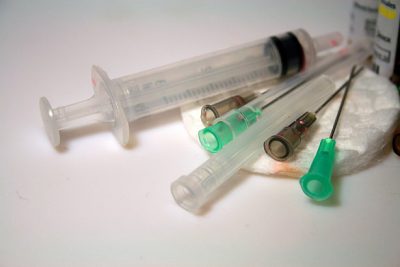
Public health officials reported six new HIV infections in the city among people who have injected drugs since November 2018 — the majority of which occurred in January, according to an advisory from the Boston Public Health Commission and the Massachusetts Department of Public Health.
The Jan. 25 advisory asked hospitals to watch for additional cases of HIV in patients reporting recent injection drug use. The advisory comes in the wake of a previous HIV outbreak in Lowell and Lawrence that involved 153 cases of the disease between 2015 and 2018, according to the Boston Globe.
“Focused efforts should be made to optimize treatment adherence and retain patients in care,” the advisory stated. “Early treatment of acute HIV infection is essential to rapidly reduce viral load to reduce forward transmission and improve patient outcomes.”
Thomas Stopka, an assistant professor of public health at the Tufts University School of Medicine, wrote in an email that while Boston and Cambridge have HIV prevention programs in place, he worried that similar HIV outbreaks may also occur in other parts of Massachusetts.
Many of the same risk factors contributing to the outbreak in Lowell in Lawrence, he wrote, can also be found in neighborhoods across Massachusetts and many other states.
“Namely, a ubiquitous presence of fentanyl in the drug supply, which is correlated with higher injection frequently and higher rates of syringe reuse, which may also contribute to more risky syringe sharing experiences, where disease transmission can occur,” Stopka wrote.
Associate Director of Communications at Fenway Health Chris Viveiros wrote in an email that the organization is caring for nearly 2,500 people living with HIV and is working with the federal, state and city governments to “reduce the number of HIV infections to zero.” Fenway Health is a healthcare clinic focused on aiding members of the LGBTQ community.
Viveiros wrote that Fenway Health has provided more than 18,500 HIV tests and worked with various HIV treatment and prevention organizations to ensure that every person has access to the treatment they need.
“Fenway Health provides care to every HIV-positive person who comes through our doors, regardless of their ability to pay,” Viveiros wrote. “We also have programs that help get people connected to health insurance, medication, housing assistance, and social support networks.”
Melissa Hernandez, 31, of Jamaica Plain, said she does not believe the outbreak will spread and become a public concern as long as people have regular medical check-ups.
“If I go to see the doctor frequently, I think I’ll be fine,” Hernandez said.
Allston resident Edwin Chung, 22, said the city should do more to inform people of the dangers of HIV as he thinks he does not learn enough about the dangers of an outbreak outside of his regular medical examinations.
“Well, with my lack of knowledge on this subject, I don’t know necessarily how big of an impact it has on our lives,” Chung said, “so it would be nice to get more of a notice from the government on these issues.”
CORRECTION: A previous version of this article incorrectly stated that public health officials diagnosed the six new HIV infections, when they did not diagnose them, they just reported the data.






















































































































